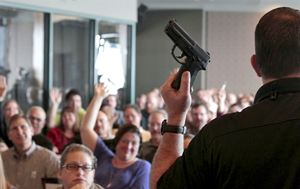Los Angeles, Jun 22: Teachers in Colorado are being trained to use guns, which they will be allowed to carry in classrooms to fire back in the event of a school shooting.
A group of 17 teachers and staff in Weld County are taking part in a three-day course this week organized by the conservative organization Coloradans for Civil Liberties.
Laura Carno, the founder of the group, told news agency that the so-called FASTER training is carried out by off-duty police officers who teach participants how to respond in the event of an emergency.
FASTER is the acronym for "Faculty/Administrator Safety Training and Emergency Response," a program created in the wake of the 2012 Sandy Hook school massacre in Newtown, Connecticut, in which 20 children as well as six staff members were killed.
"The reason why (carrying weapons in schools) is developing is because it's a dangerous world," Carno said, referring to some of the mass shootings that have taken place in the United States in recent years.
Under Colorado law, staff at schools can carry concealed weapons as long as they have a permit and are designated as security officers.
Carno said the majority of those taking part in the training this week work in rural districts where a police response could take 30 to 45 minutes.
The training involves lessons about gun safety and use as well as emergency response and how to overcome a threat as students flee a classroom that comes under attack.
"The purpose is not to replace police and emergency medical personnel, but to allow teachers, administrators, and other personnel on-site to stop school violence rapidly and render medical aid immediately," according to FASTER's website.
Such training, however, has been denounced by groups that favor gun control and who say weapons do not belong in schools.
"The dangers of adding guns to a school environment are dramatically increased by allowing loaded lethal weapons into a school environment on a daily basis -- as the promoters of FASTER envision," Ken Tolz, founder of Safe Campus Colorado, told the NBC station in Denver.






Comments
Add new comment